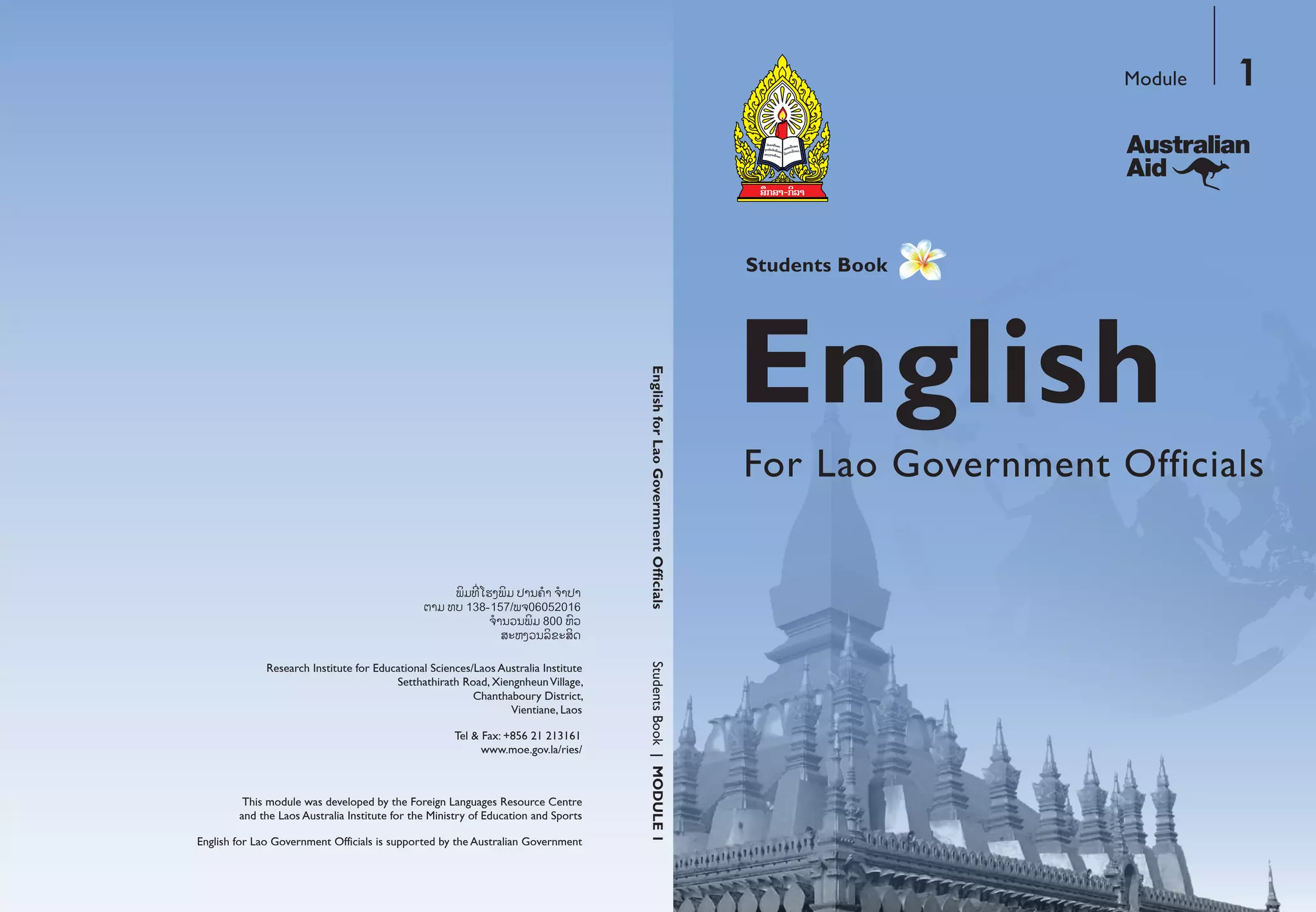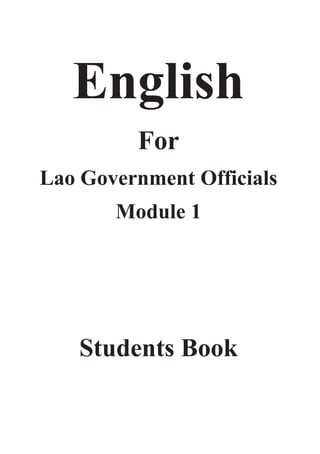The document is a module from an English textbook for Lao government officials. The first unit covers introductions, including greetings, saying the alphabet, reading about a family, talking about one's own family, and writing the days of the week. It focuses on possessive adjectives like "my", "your", "his", "her" and questions like "How many...?" and "Have...got?". New vocabulary includes words for name, family relationships, greetings and days/dates.


















































![English for Lao Government Officials Module 144
Unit 5: Occupations and Workplaces
44 English for Lao Government Officials Module 1
Writing: Personal Information
Introduction
a) Ask five people and write their answers on the chart and report back to the class.
Example: His full name is Mr Khampheng Sengsoulivong and he’s forty years old. He’s an
accountant and he works for the Ministry of Education and Sports.
Full name? Age? Occupation? Workplace?
1.
Mr. Khampheng
Sengsoulivong
40 accountant Ministry of Education and Sports
2.
3.
4.
5.
b) Complete the form. Remember to use capital letters for names and ministries.
Mr Ms Mrs Miss [Please tick ()]
Given name: ________________ Surname: ____________________
Age: ______________________ Married Single [Please tick ()]
Occupation: ________________ Ministry: _______________________
c) Write about yourself. Use the text about Khamsy as a model.
e.g. My name is _____________________. I am _________________
______________________ and _____________________. ______
Check:
the Present Simple Tense
spelling
a/an
capital letters
full stops
Unit 5: Occupations and Workplaces](https://image.slidesharecdn.com/fzudu7ytsl24an3wcyvb-signature-b7a8e7ec60a2e77810c112cda8232d9fefcbdac6c07984b746fcc276db9e13cd-poli-180810101145/85/Student-Book-Module-1-51-320.jpg)



















![English for Lao Government Officials Module 164
Unit 7: Months and dates
64 English for Lao Government Officials - Module 1
When is the That Luang Festival?
_____________________________
When is the Boat Racing Festival?
____________________________
Writing: Important dates
List about 5 of important dates in your life.
Talk to your partner or groups about these dates and why they are important to you.
Revision
a) Ask your classmate and complete the form.
What’s your full name?
What’s your first name?
What’s your family name?
What’s your occupation?
Where do you work?
What’s your phone number?
What’s your date of birth?
Are you married or single?
How many children do you have?
Mr / Miss / Mrs / Ms [please circle]
Name: ………………………………………………………………………………..
(First name) (Family name)
Occupation: …………………………………………………………………………
Workplace: …………………………………………………………………………….
Telephone: …………………………………………………………………………….
Date of birth: ………………………………………………………………………….
Married Single [please tick ()
Number of Children: …………………………………………………………………
Unit 7: Months and dates](https://image.slidesharecdn.com/fzudu7ytsl24an3wcyvb-signature-b7a8e7ec60a2e77810c112cda8232d9fefcbdac6c07984b746fcc276db9e13cd-poli-180810101145/85/Student-Book-Module-1-71-320.jpg)


























![English for Lao Government Officials Module 1 95
Unit 10: Work information
95 English for Lao Government Officials Module 1
Mr / Miss / Mrs / Ms [please circle]
Name: ………………………………………………………………………………..
(Given name) (Family name)
Workplace: ……………………………………………………………………………
Organisation: ………………………………………………………………………….
Position: ……………………………………………………………………………….
Phone number: ……………………………………………………………………….
Fax number: ……………………………. E-mail address: ………………………...
Office address: ……………………………………………………………………….
d) Work in groups of four. Take turns to talk about the form you completed.
e.g. His family name is …. He doesn’t have a fax number.
Listening: Workplaces
Introductory tasks
a) Match Lao and English workplaces.
1. Provincial Cabinet a. ໂຮງໝແຂວງ
2. Provincial Education Service b. ສະຫະພັນແມໍ່ຍິງລາວ
3. District Administration Office c. ສນກາງຊາວໜຸໍ່ມ
4. Lao Women’s Union d. ສະພາແຫໍ່ງຊາດ
5. Provincial Governor’s Office e. ຫ້ອງວໍ່າການແຂວງ
6. Lao Federation of Trade Unions f. ມະຫາວິທະຍາໄລແຫໍ່ງຊາດ
7. Provincial Hospital g. ພະແນກສຶກສາແຂວງ
8. Lao Youth Union h. ສະຫະພັນກາມະບານລາວ
9. National University of Laos i. ຫ້ອງການປກຄອງເມອງ
10. The National Assembly j. ຫ້ອງການປກຄອງແຂວງ
b) Listen and repeat.
Unit 10: Work information](https://image.slidesharecdn.com/fzudu7ytsl24an3wcyvb-signature-b7a8e7ec60a2e77810c112cda8232d9fefcbdac6c07984b746fcc276db9e13cd-poli-180810101145/85/Student-Book-Module-1-98-320.jpg)




















































































